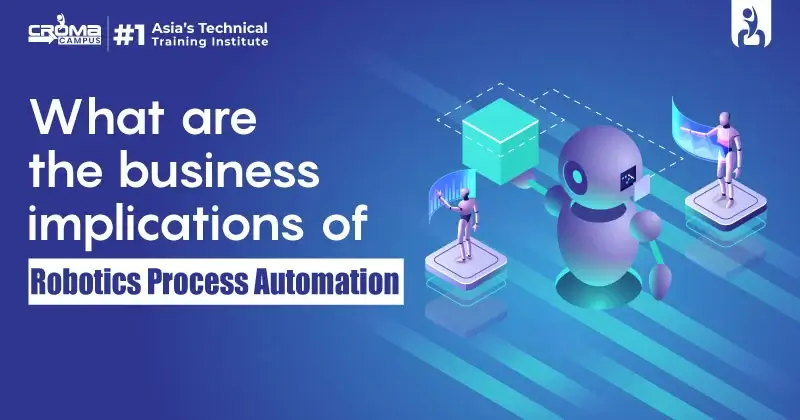What Are The Business Implications Of Robotics Process Automation?
4.75 out of 5 based on 3214 votesLast updated on 2nd Dec 2022 4.7K Views
- Bookmark

Robotic process automation is majorly implemented in various organizations. To know more about the impact of RPA on businesses read this post.

Introduction
Robotic process automation (RPA) is also known as software robotics. It works with automation technologies to mimic the office tasks of the human workforce. Basically, it can be anything, ranging from extracting data, filling in forms, moving files, reading data, or anything. It combines APIs and user interface (UI) interactions to unite and perform repetitive tasks between enterprise and productivity applications. However, RPA is taking place of most human works. And is majorly implemented in various enterprises. To be in touch with growing technologies, you can take RPA Training in Delhi to broaden your scope of knowledge. With RPA you can deploy scripts that imitate the human process. Moreover, the RPA tools complete the autonomous execution of different activities and transactions across unrelated software systems.
The impact of RPA on businesses
- Less coding: RPA does not need a developer to configure. Moving with drag-and-drop features in user interfaces makes it easier to onboard non-technical staff.
- Rapid cost savings: As RPA reduces the workload of teams, staff can concentrate on other priority work. Basically, the staff can work towards the activities that require human input Whereas, the RPA can take care of other computer-related tasks. Hence, it leads to increases in productivity and functionality of the company.
- Customer satisfaction: Since bots and chatbots can work around the clock, it reduces wait times for customers. Therefore, leading to higher rates of customer satisfaction.
- Building employee morale: As implementing RPA, it eliminates the idea of repetitive tasks and high-volume workload off your team. Moreover, RPA ensures people focus on more thoughtful and strategic decision-making. Hence this change in work brings a positive effect on employee satisfaction.
- Better accuracy and compliance: By implementing RPA robots to follow specific workflows and rules, you basically reduce human error. Especially, the work that requires accuracy and compliance, like regulatory standards. RPA can also provide an audit trail, making it easier to monitor progress and resolve issues more quickly.
- Existing systems remain in place: Robotic process automation software does not result in any disruption to underlying systems. Since bots work on the presentation layer of existing applications, it does not impact any other feature. Hence, you can implement bots in situations where you don’t have an application programming interface (API) or the resources to develop deep integrations.
Uses of RPA
- Banking and financial sector: The majority of the bots functioning today are in the financial industry. Which enables banks for early adoption of automation. As of now, many major banks use RPA automation solutions to automate tasks, such as customer research, account opening, inquiry processing, and anti-money laundering. A bank implements thousands of bots to automate manual high-volume data entry.
- Supply chain: RPA also has a major impact on supply chain operations. By combing information across shippers and operation managers, companies can better communicate with their customers. In case of unscheduled events, like delivery changes or delays, customers receive faster resolution. Thus, by moving ahead of time, businesses can improve overall customer satisfaction.
- Telecom Sector: Telecom is another sector that uses the most RPA. As this sector holds massive growth driven by the Internet of Things, 5G, and edge computing. With increasing demands, RPA can help a telecom company streamline its apps and infrastructure and help them share data.
- Healthcare: Moving towards the healthcare industry, RPA handles challenges such as billing and compliance, clinical documentation, electronic health records, patient scheduling, and more. Thus, helping organizations in becoming more efficient and effective and improving the employee and customer experience.
Conclusion
Today, RPA software is very useful for organizations that have different and complicated systems. While working with RPA technology, the software has the ability to adapt to interact with the other working system without human assistance. Looking at its major use in industries, RPA holds a bright future ahead. The RPA Training Institute in Gurgaon will help in learning the requisites of RPA. Thus, looking at its future advents and industries involvement, it will be very beneficial to move your career in this direction.
Subscribe For Free Demo
Free Demo for Corporate & Online Trainings.

























.webp)
.webp)

.png)















